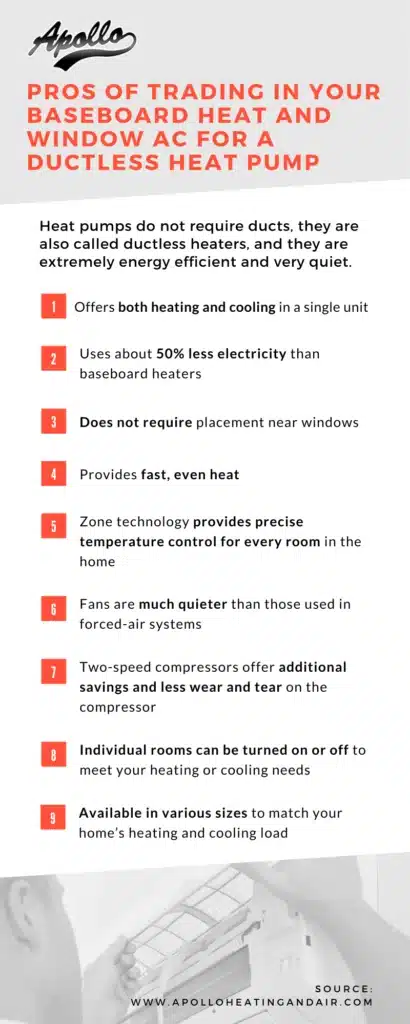Baseboard Heat and Window AC or Ductless Heat Pump?
Baseboard heating and window Air Conditioning units have been around for decades in the United States. Although heat pumps are just becoming popular in the U.S. market, they have been the go-to standard in Asia and Europe for many years.
There are several factors to keep in mind when it comes to comparing these two HVAC options.
Heat Pump Essentials
Like refrigerators, and air-conditioning units, a heat pump uses refrigerant to move heat from one area to another, and the majority of these units are reversible. During the winter months, they capture heat from the outside air, compress it, and move it inside the house. During the summer, they transfer heat from inside the home to the outdoors.
Heat pumps were very expensive when they came into the market, but prices have dropped considerably over the years as the systems have been perfected. Typically, heat pumps are powered by electricity, but natural gas models are also available.
Because heat pumps do not require ducts, they are also called ductless heaters, and they are extremely energy efficient and very quiet.
There are two main designs of ductless heat pumps:
Ground-Loop Geothermal Systems: Initially, these were the most popular heat pumps. They used pipes that looped through the ground and extracted heat from the earth. Many people still turn to these systems when they want in-ground heating.
Mini-Split Systems: Mini-splits are very versatile ductless systems that absorb heat from the air. These systems are comprised of a small, wall-mounted indoor air handling unit and an outside compressor. These units are connected by tubing that runs through a small hole in the wall. This produces less air leakage than you get with most baseboard heaters.
Heat Pumps Offer Major Savings
Heat pumps reduce electricity costs by 30 percent to 40 percent compared to electric baseboard heaters, according to the U.S. Department of Energy. When it comes to electricity consumption, ductless heat pumps are more efficient and they provide up to three times more heat than the energy they use.

Ductless Heating Pros and Cons
In addition to the sizeable savings of ductless heat pumps, they are also excellent for the environment. Because there is no combustion – which is the process that makes heat in many conventional heating systems – there are no indoor pollutants such as carbon monoxide.
Here are some Pros and Cons of a Ductless Heat Pump:
Pros
- Offers both heating and cooling in a single unit
- Uses about 50 percent less electricity than baseboard heaters
- Does not require placement near windows
- Provides fast, even heat
- Zone technology provides precise temperature control for every room in the home
- Fans are much quieter than those used in forced-air systems
- Two-speed compressors offer additional savings and less wear and tear on the compressor
- Individual rooms can be turned on or off to meet your heating or cooling needs
- Available in various sizes to match your home’s heating and cooling load
- Single outdoor condenser can support up to four individual room units
Cons
- Costs more upfront but helps to save money and energy in the long run
- Requires you to clean the filters once a month
Get Your Ductless Heat Pump at Apollo Heating and Air Conditioning
Heating, cooling, and humidity control – a heat pump does it all. Look to your air conditioner installer in the Tri-Cities, Apollo Heating and Air Conditioning, when you want to purchase a ductless heat pump. For more details, visit our website, Apollo Heating and Air Conditioning or call us at (509) 396-COLD (2653).



